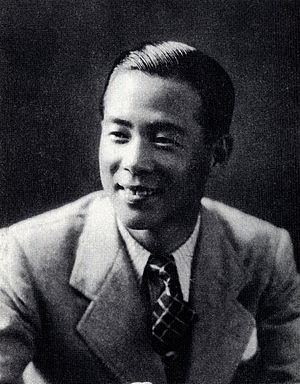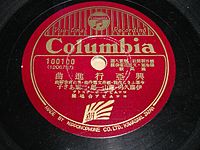Ichirō Fujiyama facts for kids
Ichirō Fujiyama (藤山 一郎, Fujiyama Ichirō, April 8, 1911 – August 21, 1993), born Takeo Masunaga (増永 丈夫, Masunaga Takeo), was a famous Japanese singer and composer. He lived from 1911 to 1993. He was known for mixing Western classical music with Japanese popular songs. This style of music was called ryūkōka.
Fujiyama was born in Chūō, Tokyo. He studied music at the Tokyo Music School. Even though he was known as a tenor in popular music, he first trained as a classical baritone singer. He also appeared in movies. Today, you can see a copy of his workroom at the NHK Museum of Broadcasting.
Contents
Life and Career
Early Life and Music
Ichirō Fujiyama was born Takeo Masunaga in a shop in Nihonbashi. He went to the Tokyo Music School. There, he learned about Western music from a German musician named Klaus Pringsheim Sr..
Becoming a Star
Fujiyama started singing ryūkōka music under the name "Ichirō Fujiyama." This was a bit risky because his school did not approve of popular music. He signed with Nippon Columbia, a record company.
He met composer Masao Koga. Together, they released his first song, "Camp Kouta." They also recorded "Sake wa Namida ka Tameiki ka." This song came out in 1931 and became a huge hit. Some people believe it sold over one million copies.
Fujiyama quickly became a big star in Japan. However, his school was very upset. They made him stop singing for a while. In 1933, he finished school and signed with JVC. He released more songs like "Moeru Gojinka" and "Cheerio!" He sang both Japanese and Western popular songs. For example, he sang "I Kiss Your Hand, Madame" as "Koi no Hanataba."
Later Career and Achievements
He later moved to Teichiku Records and then back to Columbia. During World War II, he also sang gunka, which were military songs. One famous song was "Moyuru ōzora."
After the war, he returned to Japan. He released many more hit songs. These included "Aoi Sanmyaku" and "Nagasaki no Kane."
In 1954, Fujiyama stopped singing popular music. He started working for NHK, Japan's public broadcasting organization. He became well-known as a conductor for the song "Hotaru no Hikari" at the annual Kōhaku Uta Gassen show. He conducted this song until he passed away.
He also wrote many school songs for Japanese schools. In 1989, after Emperor Shōwa died, his song "Aoi Sanmyaku" became very popular again. It was ranked as the top memorial song of the Shōwa period by NHK.
In 1992, he received the People's Honour Award. This is a very special award in Japan. Ichirō Fujiyama passed away in 1993.
At the 60th NHK Kōhaku Uta Gassen in 2009, "Aoi Sanmyaku" was sung by NYC Boys. It was part of a special performance for the show's 60th anniversary.
Discography
- Camp Kouta (キャンプ小唄, Camp Ditty) : 1931
- Sake wa Namida ka Tameiki ka (酒は涙か溜息か, Is Sake Tears or Sighs?) : 1931
- Oka o Koe te (丘を越えて, Beyond the Hill) : 1931
- Kage o Shitaite (影を慕いて, Longing for the Shadow, His Cover Version of Chiyako Sato's Song) : 1932
- Boku no Seishun (僕の青春, My Youth) : 1933
- Moeru Gojinka (燃える御神火, Burning Sacred Fire) : 1933
- Cheerio! : 1934
- Aoi Tsuki (蒼い月, Blue Moon, His Version of "Pale Moon") : 1934
- Koi no Hanataba (恋の束, Flower Bouquet of Love, His Version of "I Kiss Your Hand, Madame") : 1935
- Tokyo Rhapsody (東京ラプソディー) : 1936
- Aikoku Kōsin Kyoku (愛国行進曲, Patriotism March) : 1937
- Shanghai Yakyoku (上海夜曲, Shanghai Nocturne) : 1939
- Natsukashi no Bolero (懐かしのボレロ, Good Old Bolero) : 1939
- Natsukashi no Utagoe (なつかしの歌声, Good Old Singing Voice) : 1940
- Kigen Nisenroppyakunen (紀元二千六百年, The People's Grand Festival in 1940, "God bless the 2600th annual from Emperor Jinmu")
- Sora no Yūshi (空の勇士, Warrior in the Sky, Battle of Khalkhin Gol) : 1940
- Moyuru ōzora (燃ゆる大空, Burning Great Sky, Imperial Japanese Army Air Force) : 1940
- Kōa Kōsinkyoku (興亜行進曲, The Prosperous Asia March) : 1940
- Dase Ichioku no Sokojikara (出せ一億の底力, Show Potential Strengths of 100 Million People) : 1941
- Umi no Shingun (海の進軍, Anabasis in the Sea) : 1941
- Daitōa Kessen no Uta (大東亜決戦の歌, Song of the Greater East Asia War) : 1942
- Kessen no Ōzora e (決戦の大空へ, To the Big Sky for the Decisive War) : 1943
- Ginza Serenade (銀座セレナーデ) : 1946
- Yume Awaki Tokyo (夢淡き東京, Faint Dreaming, Tokyo) : 1947
- Asakusa no Uta (浅草の唄, Song of Asakusa) : 1947
- Aoi sanmyaku (青い山脈, Blue Mountain Range) : 1949
- Nagasaki no Kane (長崎の鐘, The Bells of Nagasaki) : 1949
- Yama no Kanata ni (山のかなたに, Over the Mountain) : 1950
- Nicholai no Kane (ニコライの鐘, The Bells of Nicholai, Holy Resurrection Cathedral) : 1951
- Oka wa Hanazakari (丘は花ざかり, Hill Is Covered with Bloom) : 1952
- Radio Taisō no Uta (ラジオ体操の歌, Song for Radio Gymnastics) : 1956 (as a composer)
Awards
- Japanese Red Cross Society special Medal for Merit (1952)
- NHK Broadcasting Culture Award (1958)
- Social Education Merit Award (1959)
- Medal of Honour with Purple Ribbon (1973)
- Japan Record Award Special Award (1974)
- Order of the Sacred Treasure, Third Class, Gold Rays with Neck Ribbon (April 29, 1982)
- Golden Pheasant Award of the Scout Association of Japan (1992)
- People's Honor Award (May 28, 1992)
- Fourth rank in the order of precedence (August 21, 1993; posthumous)



